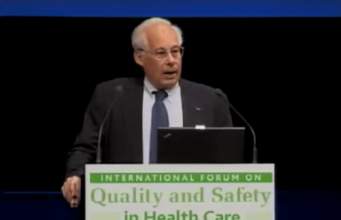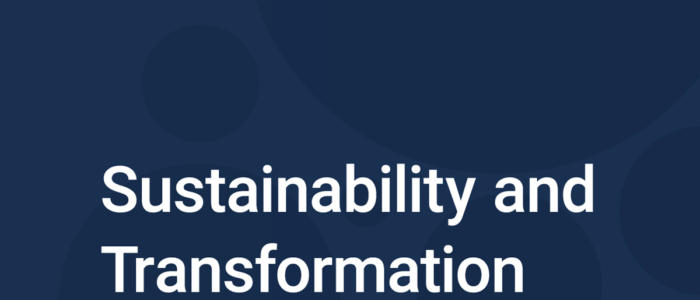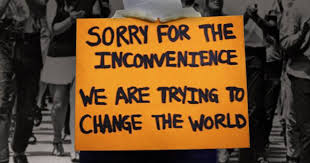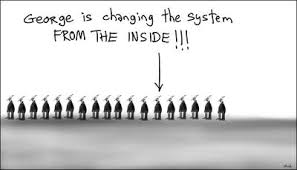One of my favourite songs as a 5 year old was ‘Here We Go Round the Mulberry Bush’. I’ve been involved with the NHS for 17 years now and every winter, we do this same dance around Emergency Departments and the total mess that surrounds hospital admissions, discharges and an ever growing list of missed targets. Unfortunately, it no longer applies only to winter. It really is an absolute shambles and the problems are only too obvious. In this blog, I plan to outline them, but hopefully move away from the classic “who’s to blame” arguments and push through towards thinking about solutions…..none of which are easy, but neither are they rocket science!
So, here is a list of problems:
- We have an increasingly elderly population, who have increasingly complex health needs. You might not think this really means that much, but it has a profound impact on how long someone might need to stay in hospital and the kind of care they might require both in terms of social care and health care in the community. A recent report by the King’s Fund showed the extra strain on the health service due to a rise in people having multiple conditions is substantial. (http://www.kingsfund.org.uk/publications/pressures-in-general-practice)
- Funding cuts in social care and ‘efficiency savings’ in the NHS are having a terrible impact on hospitals and communities alike. If, as in our locality, wards have to be closed in order to balance the books, this has a massive knock on into several areas. If you close wards, it means the hospital fills up more quickly. If the hospital is full, then where do the patients who need to go into the hospital wait? The answer is in the ED. If they are waiting in the ED, then there becomes a back log of patients who cannot be seen and there will be an automatic failure to see, treat and admit or discharge patients within the 4 hour target window, which then leads to a negative rating for the hospital under CQC and pressure from on high to ‘do something about it’. But that’s just it….what can be done? Can people just be discharged home when they are unwell? – This is happening increasingly and then they end up back in hospital the next day in a worse state. The ED departments get the blame, but there is precious little they can do. At the other end of the line are people waiting to get home, but due to the deep cuts in social care, there simply isn’t the provision to put that care in place and so they are stuck. A lack of joined up computer systems between primary and secondary care makes this even more difficult. And even where patients could be cared for at home by community teams, the correct investment has not been made in this key area, hospital staff have not been trained to work in alternative environments (and believe me, they really are different) and so the teams we need in the community simply aren’t in place in many towns, cities and rural communities.
- There is a lack of information flow about patients and the care packages they already have in place and so a massive amount of time is wasted due to poor communication.
- The ‘A&E brand’ or ED, as it is now called is incredibly strong. Everybody knows it. And so people use it totally inappropriately, sometimes out of ignorance, sometimes desperation, sometimes laziness or convenience and sometimes apathy to the strain it places on services. We either have to work with this or keep on encouraging people not to use the ED. Unfortunately studies from the USA and Canada show that the more you negatively advertise the ED, the more people will use it. The King’s Fund explain with excellent clarity some of the complexities involved. What’s going on in A&E? The key questions answered (http://www.kingsfund.org.uk/projects/urgent-emergency-care/urgent-and-emergency-care-mythbusters?utm_source=twitter&utm_medium=social&utm_term=socialshare)
- Our residential and nursing home sector is in absolute disarray and in some areas of the country they are run like cartels, holding hospital trusts and county councils to ransom in terms of affordability.
- We are still unwilling to have a difficult and frank discussion about our attitude to death and how we often keep people alive for years, when we could allow them to die naturally and peacefully (I’ve blogged on this emotive subject previously).
So what happens is we have a circular blame culture in which everybody will blame somebody else, but nobody will take responsibility and so we will continue our dance around the mulberry bush! But if you have just a tiny bit of faith, you can say to this mulberry bush, “Be uprooted and be thrown into the Sea”. Where systems become oppressive and toxic, we must pluck up the complex root structure and find a new way.
Without real commitment from the government to invest rather than cut at this crucial time of transition, spending now to make huge savings in the long term, we might just continue this dance ad infinitum. The solutions cannot deliver change by the next parliament, but the transition must be honoured as vital and therefore allowed to happen over the next 10-20 years. We need a whole systems approach and it needs to involve the following (we’re trying this in Morecambe Bay):
Firstly, we need the development of Integrated Care Communities (ICCs). ICCs are geographically based, multidisciplinary teams, led and co-ordinated by a GP and a nurse but also include the vital mix of the fire service, police, mental health teams, social services, community matrons/long term conditions nurses, district nurses, community therapy teams and representatives of 3rd sector organisations. The idea of these teams to to keep care closer to home, share information, prevent admissions to hospital, but where admissions happen, ensure they happen in a coordinated way, bringing people back home as quickly as possible. We already have some great stories emerging here of this working really successfully. These teams have the potential to change the modus operandi and bring a culture change to how care is delivered.
However, these teams will fail for the same three key reasons the NHS is currently on the ropes. Resource, recruitment and IT.
These teams will be managing complex care in the community. With not too much extra funding, GPs and the care coordinators could do some incredibly effective work, but right now, general practice is at full stretch and so convincing community teams to take on this work will not be straight forward. This resource would be best invested in two areas – recruitment of staff, or retraining of staff and secondment of them from the hospital setting into the community and the strengthening of social care teams, (which to my mind are more accountable and more effective when under the same management as the NHS and provided by the state). The investment in it would also not be huge but it does involve some upfront cash. If each GP/Care Coordinator could have a laptop with Emis Web imbedded in it, with full access to their patients notes, they could go into the hospital setting once a week, do a ward round of their patients, who they know far better than the hospital teams and get them home. With the right team investment in the community this initiative would literally save millions of bed days and save an enormous amount of resource. But the better and more important benefit will be for patients themselves However, there is a warning for the government. In order for this to be effective and have the desired impact, it MUST be double-run, rather than expecting this to be done on top of what is already the status quo. The capacity is simply not in the system, but it could so easily be and this could be utterly transformational.
Secondly, the government must reverse the perverse cuts to funding. It simply bad mathematics to think that you can shrink the size of a hospital and shrink the social care provision available in the community at the same time. We need a serious reinvestment in social care. A strong and well paid social sector will bring more people into work, which btw builds a stronger economy.
Thirdly, we need to ensure all people in residential and nursing care, and those living with complex health conditions in the community have detailed care plans in place to avoid hospital admissions, except when absolutely necessary AND in line with the persons own wishes.
Fourthly, we must co-create urgent care strategies, not designed from on high, but collaboratively between ED departments, mental health teams, the police, GPs, community nursing teams and social services. If we cannot undo fifty years of public mindset about the ED, then let’s work with this rather than against it. We need more people recruited to work in the emergency setting and the pay needs to reflect the complexity and unsocial nature of the work.
Fifthly, we must stop the nonsense around data sharing, make patient records available to patients themselves and front end our EDs, Acute Medical and Surgical Units, Outpatient Departments with the same systems as we find in the GPs, all of whom should agree to share their records. In our area this would be with Emis Web, a very straight forward system to use. It would mean far faster diagnostics, more joined up, effective care for patients and investment now by the government across the UK would save them plenty of money within just a few years. It would also make data gathering, audit and governance easier and safer. The idea of spending literally millions of pounds on apps that can input data straight into patients notes, before we have this far more vital infrastructure in place is quite frankly ridiculous!
Lastly, we must work creatively with communities on public health strategies that can have a lasting impact and so stave off the growing health crises we see emerging for the future.
I don’t know about you, but to me the dance around this mulberry bush has become pretty boring, a colossal waste of time and energy and so in my opinion, we should quite simply stop it and do something different. The solutions are right in front of us. Will the government have the guts to stop what they are doing and make the right investments now for the sake of the health and wellbeing of the population at large and the health and social care system as a whole. They might not get the glory at the next election, but in ten years time, we will see that the right choices were made for the good of all.










 All this week on the BBC, there has been a focus on the NHS and the crisis we are in – don’t panic Mr Mainwaring…..There is a heady mix of opinions being thrown around – Question Time became quite a furore of ideas and thoughts last night – not enough beds, not enough staff, not enough money, too much money, too many patients, too many wasted appointments, too many malingerers, too many ill people, too many old people, too many managers, too many drugs, too many drunkards, disappointed clinicians, disappointed patients, disappointed MPs, a disappointed health secretary – what are we to think and what are we to do?
All this week on the BBC, there has been a focus on the NHS and the crisis we are in – don’t panic Mr Mainwaring…..There is a heady mix of opinions being thrown around – Question Time became quite a furore of ideas and thoughts last night – not enough beds, not enough staff, not enough money, too much money, too many patients, too many wasted appointments, too many malingerers, too many ill people, too many old people, too many managers, too many drugs, too many drunkards, disappointed clinicians, disappointed patients, disappointed MPs, a disappointed health secretary – what are we to think and what are we to do? We love the NHS because it speaks something to us about our togetherness and our commitment to health justice for all. This circular argument about money is the wrong conversation and it is beginning to have a very nasty undertone about who we might be able to blame and scapegoat in order to solve the mess we are in. Let’s be very clear. The NHS is NOT in crisis because of refugees, asylum seekers, immigrants or health tourists. I’m going to stick my neck out here – it isn’t even the fault of the current and previous health secretaries, though it would be easy to play the blame game that way too. The NHS is in crisis, because the entire Western World is in crisis! Our economic systems are broken and our political systems are pretty defunct. We have built our nation state on the foundations of empire. We have built our economy on conquest and slavery and have used debt, violence and law to keep control….but everything is shaking.
We love the NHS because it speaks something to us about our togetherness and our commitment to health justice for all. This circular argument about money is the wrong conversation and it is beginning to have a very nasty undertone about who we might be able to blame and scapegoat in order to solve the mess we are in. Let’s be very clear. The NHS is NOT in crisis because of refugees, asylum seekers, immigrants or health tourists. I’m going to stick my neck out here – it isn’t even the fault of the current and previous health secretaries, though it would be easy to play the blame game that way too. The NHS is in crisis, because the entire Western World is in crisis! Our economic systems are broken and our political systems are pretty defunct. We have built our nation state on the foundations of empire. We have built our economy on conquest and slavery and have used debt, violence and law to keep control….but everything is shaking. brave enough to rewire our brains, realign our values and reimagine a different way of being together? If we accept that things simply cannot remain as they are, might we instead find one another in fresh ways and discover new ways of being in which we’re not always chasing the money, with all its strings attached, but choosing something altogether more life giving?
brave enough to rewire our brains, realign our values and reimagine a different way of being together? If we accept that things simply cannot remain as they are, might we instead find one another in fresh ways and discover new ways of being in which we’re not always chasing the money, with all its strings attached, but choosing something altogether more life giving? I would suggest we need two things (an ambidextrous approach) – both of which are already happening, we just need to recognise them, fan the flames and watch the new emerge, whilst Rome burns around us.
I would suggest we need two things (an ambidextrous approach) – both of which are already happening, we just need to recognise them, fan the flames and watch the new emerge, whilst Rome burns around us. are beginning to think about how we are living and making a change. It’s a tough reality, but there is personal and corporate responsibility that we need to take. We cannot keep shoving poison into our bodies or treating them badly and expect that we will be well, or that we will be able to afford the drugs to fix us. Social movements are beginning to emerge and we need to be a part of them. Together, we can! Together we can cause corporations to change their behaviour and act in accordance with what is right, true, just, kind and loving. We can also choose to take responsibility for what we buy and how much exercise we do. Here in Morecambe Bay we are launching the Morecambe Bay Mile, encouraging everyone to move a mile a day without transport! We’re also working with our communities around diet. We’re also connecting with amazing people doing amazing things and seeing just how much kindness and goodness there is in the communities around us. Our happiness is directly linked to the quality and depth of our friendships. People being together and facing up to the issues together is absolutely key to our long term health.
are beginning to think about how we are living and making a change. It’s a tough reality, but there is personal and corporate responsibility that we need to take. We cannot keep shoving poison into our bodies or treating them badly and expect that we will be well, or that we will be able to afford the drugs to fix us. Social movements are beginning to emerge and we need to be a part of them. Together, we can! Together we can cause corporations to change their behaviour and act in accordance with what is right, true, just, kind and loving. We can also choose to take responsibility for what we buy and how much exercise we do. Here in Morecambe Bay we are launching the Morecambe Bay Mile, encouraging everyone to move a mile a day without transport! We’re also working with our communities around diet. We’re also connecting with amazing people doing amazing things and seeing just how much kindness and goodness there is in the communities around us. Our happiness is directly linked to the quality and depth of our friendships. People being together and facing up to the issues together is absolutely key to our long term health. Secondly, we must stop serving the system, re-humanise it, call it in line and cause it to serve the needs of the people and the planet (the right handed approach). Those in the health and social care system must refuse to be bullied by the powers into ways of behaving, stop thinking they have the answers and therefore coming up with another new scheme to do to people and be willing to listen to and work with the emerging social movements. This will allow us to see a society that is much more well and therefore in need of less care. But where care is needed, we have to accept that we have allowed ourselves to be competitive rather than collaborative, hierarchical instead of co-operative and our own attitudes and behaviours are stopping us from giving the compassionate care we long to deliver. We cannot make excuses. We must let go of self-protectionism. We must be willing to change the way we think and behave, breaking down walls, letting go of suspicion and cutting through red tape so that we provide the care which we can. This is happening, here in Morecambe Bay – but it’s not a quick thing. We are rediscovering the power of relationship and daring to make some bold steps into delivering care very differently – but for those of you outside the system, please understand, it takes time and feels pretty scary!
Secondly, we must stop serving the system, re-humanise it, call it in line and cause it to serve the needs of the people and the planet (the right handed approach). Those in the health and social care system must refuse to be bullied by the powers into ways of behaving, stop thinking they have the answers and therefore coming up with another new scheme to do to people and be willing to listen to and work with the emerging social movements. This will allow us to see a society that is much more well and therefore in need of less care. But where care is needed, we have to accept that we have allowed ourselves to be competitive rather than collaborative, hierarchical instead of co-operative and our own attitudes and behaviours are stopping us from giving the compassionate care we long to deliver. We cannot make excuses. We must let go of self-protectionism. We must be willing to change the way we think and behave, breaking down walls, letting go of suspicion and cutting through red tape so that we provide the care which we can. This is happening, here in Morecambe Bay – but it’s not a quick thing. We are rediscovering the power of relationship and daring to make some bold steps into delivering care very differently – but for those of you outside the system, please understand, it takes time and feels pretty scary! more healthy and well and we changed our ways of working to be more collaborative and kind. It is this ambidextrous approach to health and wellbeing, in which a heady mix of an invigorated people movement and a reorientated system working together for the good of everyone everywhere, might breathe hope into other parts of the world that out of the old can come something new. Maybe it is just possible that healthcare can be provided for everyone everywhere when people are brave enough to let go of old ways, embrace the brokenness of our reality and find a new way through together.
more healthy and well and we changed our ways of working to be more collaborative and kind. It is this ambidextrous approach to health and wellbeing, in which a heady mix of an invigorated people movement and a reorientated system working together for the good of everyone everywhere, might breathe hope into other parts of the world that out of the old can come something new. Maybe it is just possible that healthcare can be provided for everyone everywhere when people are brave enough to let go of old ways, embrace the brokenness of our reality and find a new way through together. I’m telling you – it is nearly Spring time and the bulbs are beginning to break through. Can you smell the scent of something new emerging? Those rhizomal roots of the snowdrops – that interconnected underground network that shoots up its flowers, is telling us the winter of discontent is over. It’s time to turn off the radio, dial down the meta narrative of fear and instead, put on love, hope and faith, find each other, change our ways of working and step into the future we know our hearts yearn for.
I’m telling you – it is nearly Spring time and the bulbs are beginning to break through. Can you smell the scent of something new emerging? Those rhizomal roots of the snowdrops – that interconnected underground network that shoots up its flowers, is telling us the winter of discontent is over. It’s time to turn off the radio, dial down the meta narrative of fear and instead, put on love, hope and faith, find each other, change our ways of working and step into the future we know our hearts yearn for.

